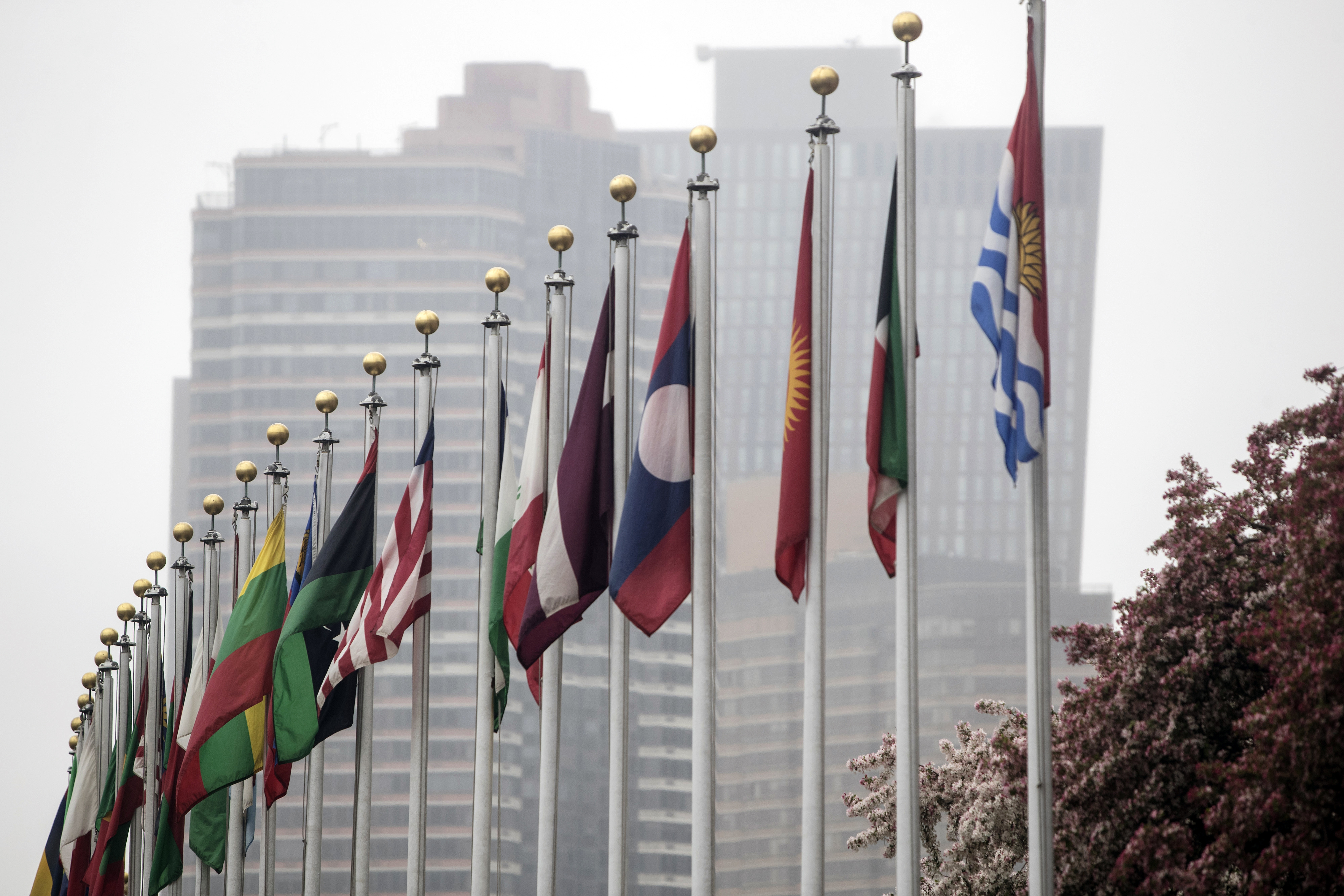Amid Allegations of Abuse, Aid Workers Describe Culture of Sexual Misconduct

International flags fly outside the Secretariat building at the United Nations (UN) headquarters in New York, U.S., on April, 27, 2018. (Victor J. Blue/Bloomberg via Getty Images)
Amid allegations of sexual abuse by United Nations peacekeepers in the world’s conflict zones, humanitarian aid workers are speaking out about what they describe as a culture of sexual misconduct within the UN and other major international humanitarian organizations.
FRONTLINE recently investigated abuse by peacekeepers in the documentary UN Sex Abuse Scandal. Since the early 1990s, more than 2,000 young women and children have been allegedly sexually exploited or abused by UN peacekeepers in missions across the world.
But allegations of sexual misconduct have also emerged from within the ranks of the UN and other aid organizations, according to multiple experts and former humanitarian aid workers. They describe a male-dominated sector where workers frequently move from post-to-post and are often placed in high-stress environments with little oversight and inadequate reporting mechanisms.
“This is a particular industry that is driven a lot by a toxic masculinity culture. Working in the field, doing emergency work, there’s a little bit of a cowboy attitude that can come out,” said Lina Abirafeh, director of the Institute for Women’s Studies in the Arab World at the Lebanese American University, and with around two decades of experience in humanitarian settings. “Everybody is living in very challenging and constraining circumstances, often deprived of friends, family, holiday, reasonable working hours, comfortable living conditions. All of this together is like the perfect storm.”
In the aftermath of reports that Oxfam employees used prostitutes in Haiti in 2011, the organization said that it had investigated 42 allegations of sexual misconduct in 2017. Médecins Sans Frontières came forward with 24 identified cases of sexual harassment or abuse in the field in 2017, while Plan International revealed nine incidents of sexual harassment or misconduct between July 2016 and June 2017. Save the Children reported 32 cases of sexual harassment and bullying in 2016 and 2017, according to a Save the Children spokesperson.
Last month, the United Kingdom Parliament’s International Development Committee also released a report suggesting that “sexual exploitation and abuse is endemic across the international aid sector,” with evidence that “there can exist within aid organisations a culture which provides fertile grounds for sexual harassment and abuse against aid workers.”
The report cited a survey conducted by the Humanitarian Women’s Network that documented the responses of 1,005 women across more than 70 organizations in the humanitarian field. That survey found that more than half of respondents had reported “persistent romantic/sexual advances,” and that 20 percent were threatened with physical aggression. It also found that four percent of respondents had been “forced to have sexual intercourse.”
A major issue within the humanitarian aid sector is lack of sufficient reporting mechanisms, according to experts. They say that even when organizations do have ways to report misconduct on paper, they often aren’t well implemented or trusted, and that human resources departments within organizations may not be equipped to deal with complaints.
For victims who do manage to speak out,
“What we overwhelmingly found is that the people sexually abusing aid workers are their own colleagues, and that it’s usually men in positions of power,” said Dyan Mazurana, a professor at Tufts University who co-wrote a report last year on sexual harassment and assault against aid workers, and whose research was cited in the UK report. “So, if you have a reporting chain of command that goes through the men in power, there’s a good chance it’s going to come across the desk of the person who is perpetrating it — or they’re going to be friends with that person.”
More than 120 CEOs of U.S.-based international NGOs have signed a pledge promising to strengthen policies to prevent sexual misconduct by staff. Some organizations are starting to take more concrete actions.
In July, UN Secretary-General António Guterres said at a press conference that his organization had taken several steps to tackle sexual harassment, including the creation of a specialized team to focus on sexual harassment investigations, a 24-hour “Speak Up” secretariat hotline for staff to confidentially report and seek advice, and revamped mandatory training that he said more than 14,000 staff have already completed.
Abby Maxman, president of Oxfam America, told FRONTLINE that the organization has worked to tighten reporting standards and better communicate with other NGOs across the sector. For example, Oxfam implemented a 10-point plan to stamp out sexual harassment and abuse, including the creation of an independent commission tasked with investigating cases and making recommendations. It’s also in talks with the UN and other humanitarian organizations to establish a system to stop offenders from moving across the sector.
Experts and groups have proposed other ideas. Save the Children, for example, proposed that INTERPOL, an international police organization, establish a global criminal records background check. The International Development Committee report called for an independent aid ombudsman to provide support for survivors and global register of aid workers to prevent predators from entering the sector.
Despite these initial steps, experts acknowledge that this is a problem that will require a long-term commitment across the sector.
“[I]t is increasingly clear that [abuse] happens more than organizations are aware of, more than organizations are willing to acknowledge, and that there aren’t great mechanisms for supporting women who have been abused in the field,” said Dina Francesca Haynes, director of the Human Rights and Immigration Law Project at New England Law. “The larger issue has to do with a pervasive culture of sexism and gender inequality.”





